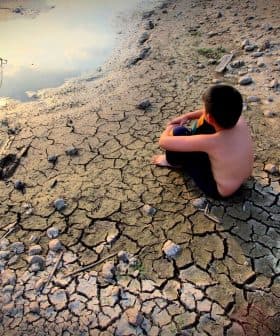Scientists Calculate the Contribution of Air Travel to Climate Change
Global aviation accounts for 4 percent of human-induced global warming. A reduction in flights by 2.5 percent per year would halt aviation’s contribution to further warming.
Aviation contributes to approximately 4 percent of anthropogenic global warming and 2.4 percent of annual human-generated CO2 emissions, with the impact expected to increase by 0.1 ºC by 2050 unless significant changes are made to reduce carbon emissions and transition to more sustainable fuel sources. The study emphasizes the importance of reducing unnecessary air travel and transitioning to carbon-neutral fuels to mitigate the aviation industry’s impact on climate change, highlighting the need for collective action from both industry and individuals to address this issue.
Climate scientists quantified the impact of aviation on climate change, finding that passenger and commercial flights around the globe account for approximately 4 percent of the anthropogenic overheating of the planet to date.
Air travel is also responsible for 2.4 percent (around 1 billion tons) of the annual human-generated CO2 emissions and is expected to increase global temperature by 0.1 ºC by 2050, the scientists said, provided that global aviation will continue to grow at pre-pandemic rates.
Flying is also one of the most carbon-intensive ways to travel, emitting up to 100 times more per hour than train, bus or shared car rides.
“These numbers don’t seem high, but again, remember that is more than most countries emit,” Milan Klöwer, a postdoctoral researcher at the University of Oxford and one of the study authors, told Mongabay conservation news service.
To assess the aviation industry’s impact on climate change, the researchers used flight history data obtained from international aviation organizations and databases, in combination with the annual fuel consumption and distance covered by global air travel derived from various studies and scientific papers.
See Also:Passenger Plane Flies 560 Kilometers Using Recycled Cooking OilTheir study, published in Environmental Research Letters, is among the few attempting to calculate how much human-caused global warming may be attributed to air travel.
“Most people think of warming in terms of degrees, not tons of carbon emitted, so we wanted to calculate that,” Klöwer said.
The researchers acknowledged that flying can be the only available means of travel, albeit with a heavy carbon footprint.
“Flying often provides the only possibility to reach remote locations within an acceptable time frame,” they noted. “However, flying is also one of the most carbon-intensive ways to travel, emitting up to 100 times more per hour than train, bus or shared car rides.”
Apart from CO2 emissions, the researchers explained that another reason for aviation’s high contribution to Earth’s overheating is the mix of climate pollutants jet fuels generates when burning.
“Nitrogen oxides [gasses emitted from aircraft exhaust] react in the atmosphere altering the radiative balance of other gasses, including methane, ozone and stratospheric water vapor and therefore indirectly impact the climate,” they wrote. “These non-CO2 emissions cause an additional net warming effect.”
Aircraft also contribute to climate change through condensation trails (contrails), a significant factor in aviation’s impact on the planet’s climate.
These evanescent line-shaped clouds of ice form when soot from the engine exhaust mixes with the cold air are high altitudes, increasing the sky’s cloudiness and trapping the heat radiating from Earth at night.
The study suggested that a decrease in flights by 2.5 percent per year or a transition to a 90 percent carbon-neutral fuel mix by 2050 would effectively curb the aviation-related warming of the planet.
“I’ll just stick to the ones [flights] that are really important, and replace the other ones with virtual meetings or holidays closer to home,” said Klöwer, urging frequent air travelers to reconsider boarding a plane if not necessary.
Klöwer finally acknowledged that the power to decarbonize air travel lies chiefly with the industry and governments. However, individuals can promote change if they mind their carbon footprint and engage in the discussion.
“If everyone talks about it, that can create political change,” he said.
Share this article









